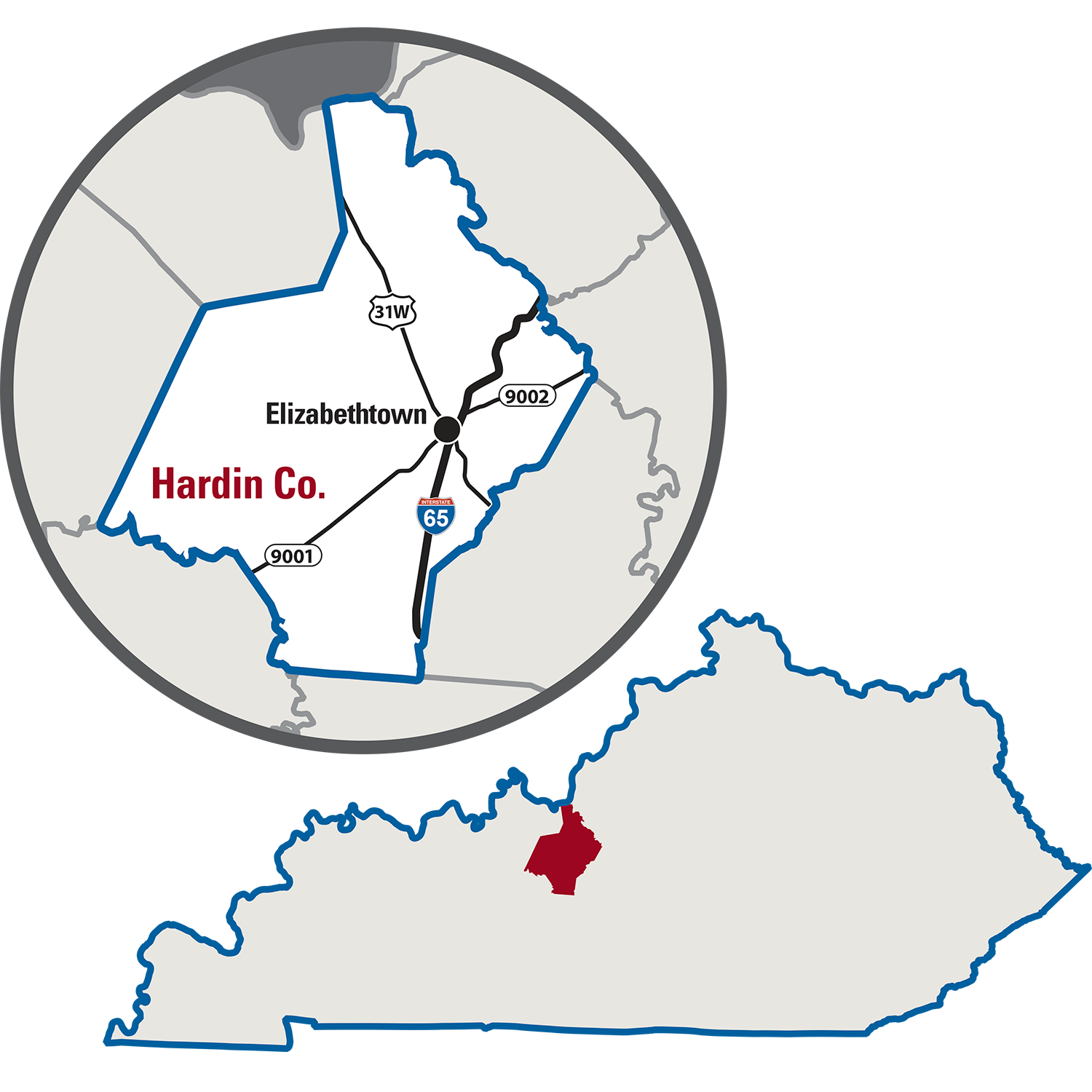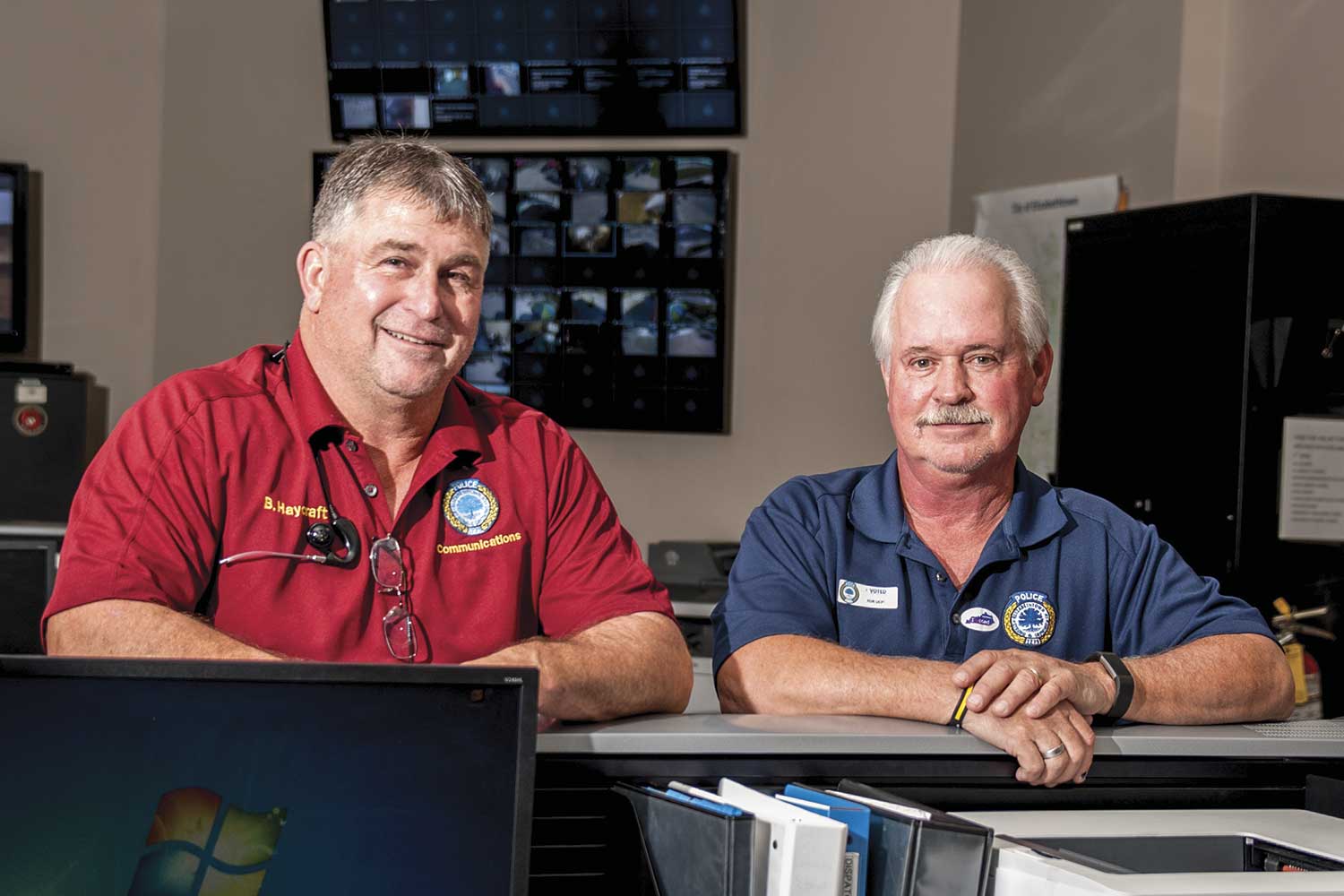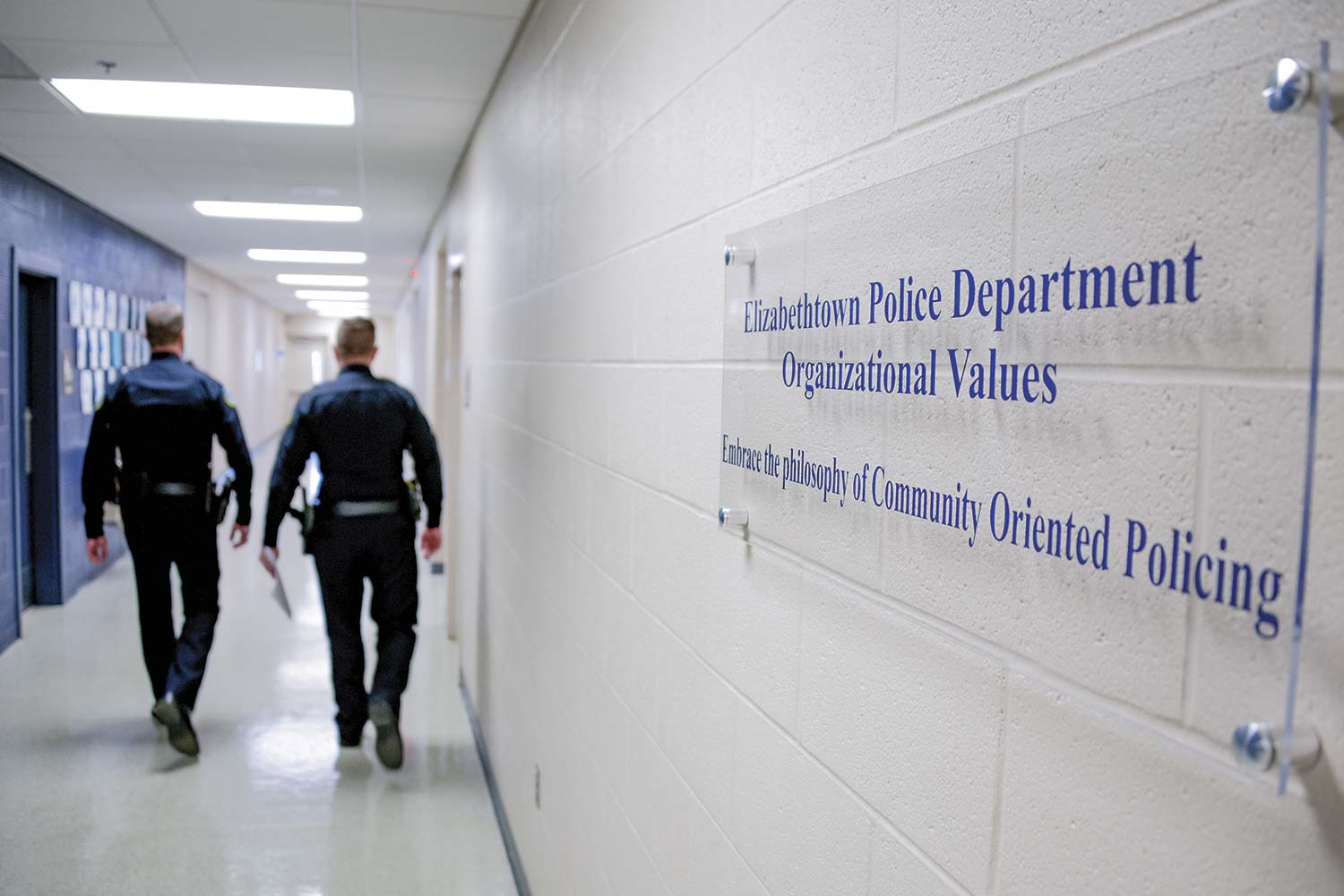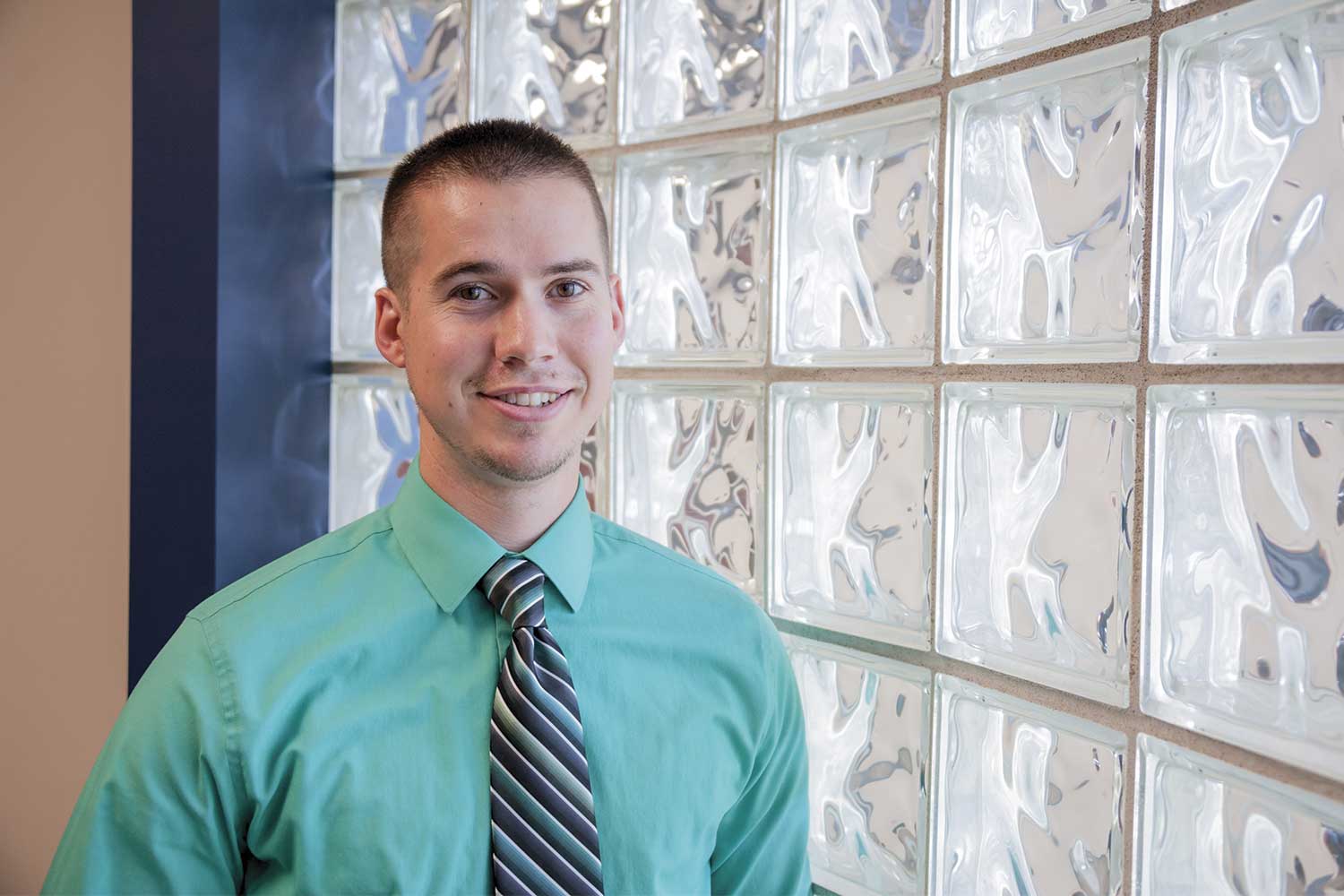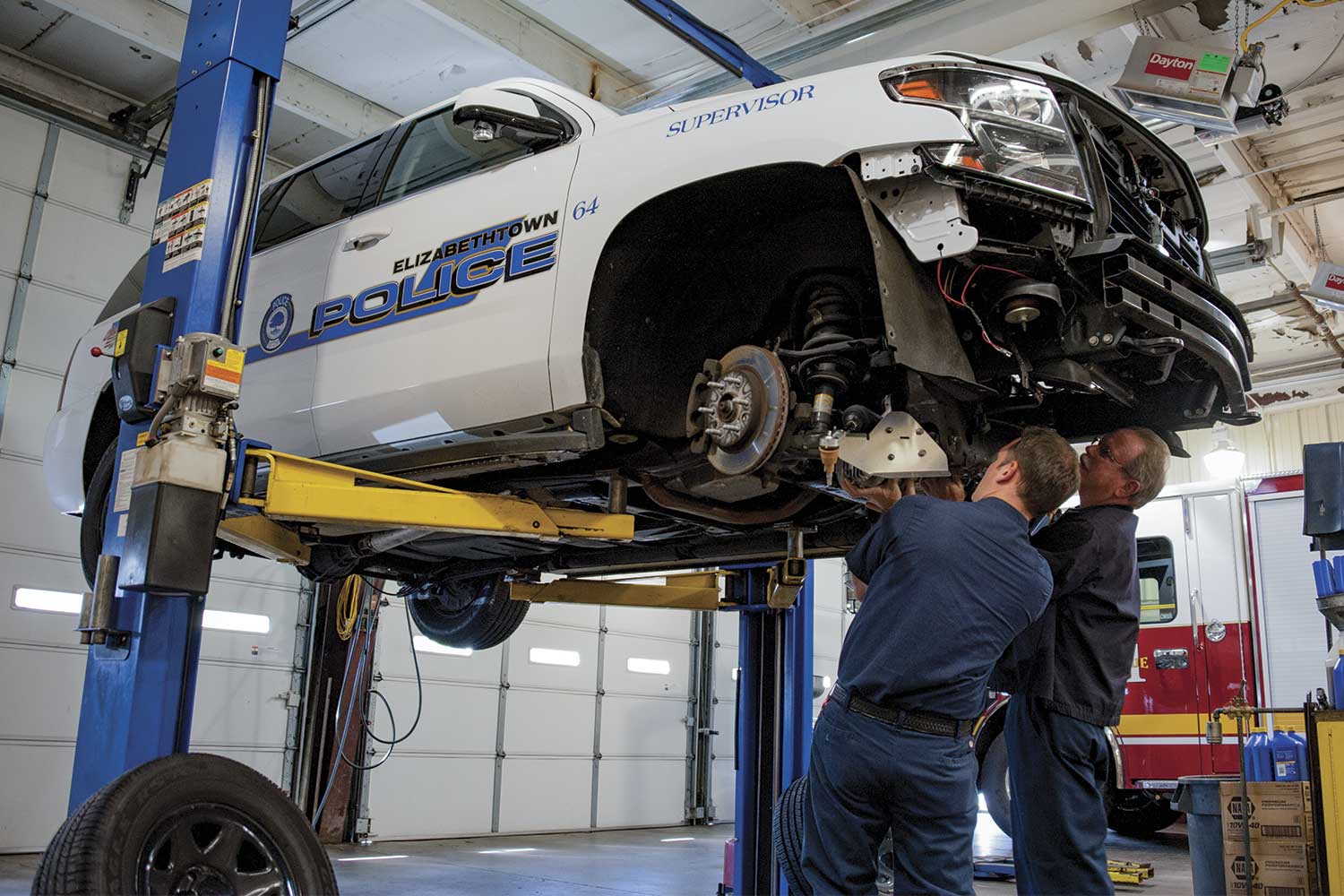Elizabethtown Police Department
PICTURED ABOVE
Fully staffed, Elizabethtown Police Department employs 76 officers and civilians. Fifty-seven staff members are sworn officers. (Photo by Jim Robertson)
When Darrell Brangers began his career as a dispatcher with the Elizabethtown Police Department, he was one of four dispatchers working with 21 police officers. It was 1980. Brangers worked the night shift and remembers a time when around midnight, dispatchers could log themselves out and there were no calls again until after sunrise.
“It was just that dead after midnight,” he said.
Of course, at that time the city’s population was slightly more than 15,000. But Elizabethtown was steadily growing. In 38 years, Brangers has watched the city double in size – and the police department doubled along with it.
Today, EPD boasts an authorized strength of 57 sworn officers, 34 of whom are assigned to patrol duties. The police department also employs 19 civilians – including Brangers, who is now EPD’s dispatch supervisor. Thirty-eight years into his career in EPD’s communication center, Brangers said he’s happy to be in an administrative role, no longer answering 9-1-1 himself. The stress and secondary-trauma of dispatching was taxing.
“I couldn’t do it anymore,” Brangers said of dispatching full-time. “I loved it, and when I started dispatching it was fun.”
EPD’s officers responded to more than 42,000 calls for service in 2017, the majority of which included vehicle crashes, alarms, suspicious persons and thefts, according to the department’s annual report.
“We work a lot of wrecks,” said EPD Chief Jamie Land. “Typically, we work anywhere from 1,500 to 1,600 wrecks every year. A lot of our crime is property theft. People leave their cars unlocked – we have lots of groups who like to go around neighborhoods pulling on door handles.”
But the department also responds to a myriad of welfare check requests, largely stemming from an abundance of individuals who travel to Elizabethtown seeking addiction treatment.
“We are kind of unique here,” Land explained. “We have several drug-treatment centers, and we have halfway houses that, when individuals leave the treatment centers, they go to our sober-living facilities. We get a lot of welfare check calls from their families wanting to know how they’re doing and if they’re here.”
“Another huge contributing factor is that Communicare, our regional mental-health service provider, is based here,” added EPD Public Information Officer John Thomas. “We get a lot of welfare check calls from them, too. They have clients they’re concerned about who live in this area, and they need us to check on them. We also have people who leave facilities against medical advice. Hardin Memorial Hospital calls us frequently when somebody walks away from care.”
The treatment centers create an influx of temporary residents, not only from surrounding counties, but also from surrounding states. This transient population is becoming an issue for EPD officers, Land said, leading to an increase in homelessness and panhandling in the community.
However, EPD is not fighting the issue alone. Often there is a crossover between the population seeking drug treatment and individuals suffering from mental-health issues. To properly respond to these individuals’ needs, EPD participates in a regional Crisis Intervention Training (CIT) board.
“Police officers, county attorneys, judges, Communicare, hospitals – everyone comes together to troubleshoot CIT issues in the area,” said Thomas, who also serves as the department’s CIT coordinator. “We are all different links in the same chain. With this group, everybody can sit down and have a say at the table.”
Elizabethtown Police Chief Jamie Land has served the department for 20 years. He has been chief for about one year, following the retirement of former EPD Chief Tracy Schiller. (Photo by Jim Robertson)
“It has paid dividends, most definitely,” Land added.
CIT is a program that trains officers in “verbal de-escalation, active-listening skills and non-lethal weapons use,” its website states. Thirty-six EPD officers have been trained in CIT skills, and Thomas said the department’s goal is to see everyone CIT trained.
“The reality is, police are dealing, at an increasing rate, with the mentally ill,” Thomas said. “All trends point to that continuing to be a greater and greater issue. Officers learn de-escalation skills, and learn to recognize the signs and symptoms of mental illness. The main goal is to get the mentally ill the help they need and not to criminalize behavior that should be addressed as a mental illness. It just keeps everybody safer, both the safety of the officer and the consumers we encounter.”
Community-focused
In 2011, when former-EPD Chief Tracy Schiller took the helm of the agency, Land said he began a cultural shift toward a more community-oriented department.
“At first, I was hesitant,” Land said of the directional change. At the time, Land had served roughly 13 years with the department. “But (Schiller) sold me on it. Now that’s really moving forward.”
Two officers are assigned to community activities, and the department’s list of participating events is robust.
EPD Public Information Officer John Thomas (right) is assigned to coordinate community programs. Many programs are geared toward children and provide insight into potential law enforcement careers. (Photo by Jim Robertson)
Cops and Cones (a free ice cream event), Cram the Cruiser (a school-supply-gathering event), Cops and Bobbers (a fishing event), D.A.R.E., Coffee with a Cop, five Halloween events, National Night Out (a community-police-awareness raising event), Christmas Shop with a Cop, honorary veteran luncheon – these activities simply scratch the surface of the two-page list of community-minded activities in which the department participates and/or leads.
In addition to these short-term events, EPD also operates an eight-week Citizens’ Police Academy for adults twice per year and a five-week CPA program once annually for teens. EPD recently graduated its 33rd adult CPA class and its sixth teen CPA.
The teen CPA was created by popular demand, largely from parents who attended the department’s adult CPA and saw the benefit of teens learning more about local law enforcement functions, Thomas said.
“We had 45 in our last class,” Thomas said of the teen academy. “The way that we pitch it, No. 1, it’s just a great way for students to learn a little bit more about their community, become aware of some of the crime problems, drug problems and quality-of-life issues that are in their community. Then it’s a great way to get a first-hand look at policing as a possible career option. The program is for kids 14-18, so they are kind of in their formative years where they’re trying to make decisions.”
Teens hear from EPD’s major crime investigators, K-9 unit, accident reconstructionists, Special Response Team and one of its use-of-force instructors during the five weeks. One week is devoted to teaching the teens about response to resistance and involves the participants engaging with the firearms training simulator.
“They get to step into the shoes of a police officer and make those life and death decisions that we make,” Thomas said. “That’s probably one of the most eye-opening experiences our participants can go through. We get routine feedback that it is one of the best experiences to realize we make decisions under great duress with very little time to make them.”
Teens who want to take a more committed step toward a potential law enforcement career also have the opportunity to participate in EPD’s cadet program. Beginning at the age of 16, residents can apply to become a cadet – a program that has been operational for more than 20 years.
“The program began as a way to provide career and leadership training to young people who are considering law enforcement, and has developed into a substantial resource to the police department and the community,” the EPD website states.
Cadets meet twice a month at the police department and participate in a variety of department activities, ranging from traffic control during city parades to assisting with the Kentucky Special Olympics Torch Run.
EPD Detective Joe Swartz became an EPD cadet when he was 17. A good friend of his was involved at the time and talked him into coming. While he was considering a variety of public service careers, he had not settled on law enforcement as his reasoning behind becoming a cadet. It was just a cool thing to do, he said.
“It was almost like every other job I was considering was theoretical,” Swartz said. “I would hear about it or read about it. In high school, they have you do those surveys where they tell you what job they think you would like. But really, the deciding factor was the ride-alongs. And just being here (at the police department). I could see myself doing what I saw them doing.”
Swartz went to college still undecided about his future career, but maintained his cadet status with EPD until he was 21 – the oldest age a cadet can serve. When he finally applied and was hired as a full-time patrol officer, Swartz said the experience he earned as a cadet was beneficial to his transition.
“There are a lot of people who get into policing who may have a pretty good idea, but don’t know that full picture of what it’s like to do the job,” Swartz said. “I’m not saying as a cadet I understood it, but (after being hired as an officer), nothing was a shock or surprise. Of course, sitting in the car and seeing a response to something was really exciting. I also saw the hours-on-end of almost nothing. I knew that was coming and I was fine with it.”
All the efforts EPD officers invest into the community have come back ten-fold, Land said. Graduates from the many Citizens’ Police Academies now serve in an alumni association and volunteer to assist with nearly every community event.
“We couldn’t do what we do without them,” Land said.
But the community also has found another way to give back to the police who serve them. In 2013, the Elizabethtown Police Foundation was created. The non-profit organization is led by Executive Director Carl Bee, EPD’s evidence manager, who retired as EPD’s deputy chief in 2011, after a 22-year career. The foundation has a board of directors comprised of local business and community leaders.
“After the death of Officer Jason Ellis in Bardstown, the thought was, ‘Well, what if something like that happened in our community? What resources would we have available to help?’” Bee said. “There’s obviously Supporting Heroes and those organizations, but they wanted something that would be a little closer to home, just for the police department.
“Our basic function is to provide support for employees of the police department,” Bee continued. “Not just sworn employees, but all employees in times of crisis and need.”
Since its inception, Bee said the foundation has assisted an officer who was critically injured in an incident, an officer whose home burned and an employee whose husband died suddenly. The financial assistance is generated through a multitude of fundraisers, including a golf scramble, a murder-mystery dinner, and recently, the Light Up the Night 5K run, which had more than 400 participants.
“I think it gives them some peace of mind knowing that if something happens, the community is behind the police department,” Bee said. “We have had an unbelievable outpouring of support for this foundation. When we have a fundraiser, Elizabethtown is very willing to open their pocketbooks to support this department.”

